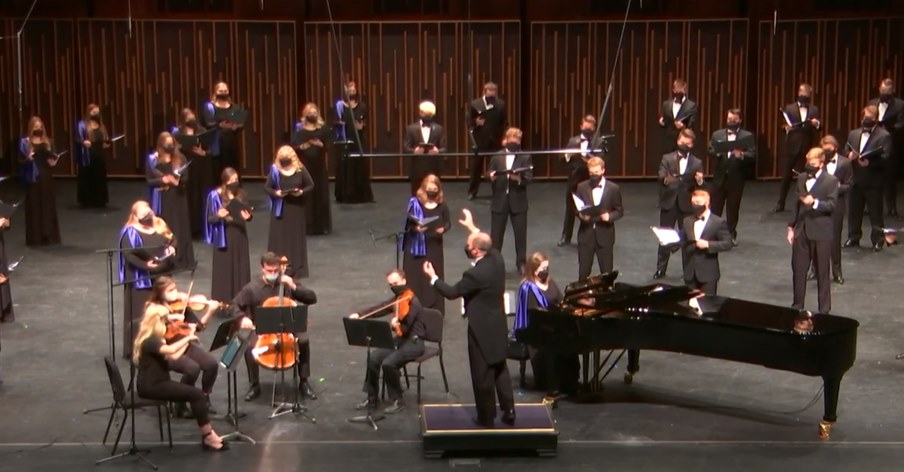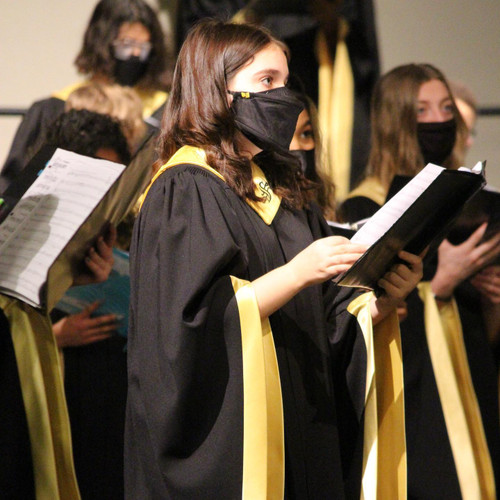The RESONANCE Singers' Mask: testing, testing, SINGING!!, testing
Posted by Robbin Rosh Rose on Feb 28th 2021
Colorado STATE Testing:
After introducing our RESONANCE Singers' Mask prototypes at the Virtual June 2020 ChorusAmerica conference, we were given the opportunity to send prototypes to Colorado State aerosol lab for testing in early July, and those results were published, along with several others, as part of their interactive mask effectiveness charts, and people continue to reference those results. Again, those published results refer to tests on our PROTOTYPE Mask.
When we found that the CU Lab comparison charts declared that “ALL Singers’ masks” performed badly, we entered in to several conversations with Dr. John Volckens and more often his assistant, who actually conducted the tests, Dr. Christian L’Orange. We made changes and improvements to the RESONANCE Mask fabric choices and construction as a direct result of those tests and conversations. And, as we produced more masks, we continued to improve our mask; adding a sewn-in silver-infused polypropylene filter layer (the biggest noticeable change) beginning with October 2020 production.
Unfortunately, the prototype Resonance test results were permanently published in their charts and embedded in the Music & Performing Arts video broadcasts. Dr. L’Orange has assured us that when they update their Colorado State Lab website, they will include the more recent test results of our actual production Resonance masks, but since their website update has been delayed several times (they are busy working on air exchange measurements for classrooms now) they offered to take down the specific results for our prototype mask for now. They agreed that leaving those results up were causing mis-information to continue to be distributed.
Filtration is important, but equally important is how the Mask FITs:
Simply stated, the Colorado State aerosol labs’ test is for filtration only. There are 2 masks that specifically “look great” in their tests, that do not function nearly as safely as one might assume, as the fit of the mask is loose & in-secure on the face as well as made of a difficult to breathe through neoprene material (TMF Vocal Performance mask) , or in one instance (The NOTEable Mask), instructs the wearer to be certain to leave “2 fingers’ width open at the bottom of the chin”. The NOTEable mask is constructed of such tightly woven material that to actually breathe through the fabric is very challenging, thus the need to allow air passage up from the bottom.
There are some important factors one needs to consider when choosing a mask for SINGING that differ from considerations for a daily use mask.
The mask must fit closely to the face, without moving/slipping/dislodging from the face when engaging the face and mouth in complete width of movement necessary for a healthy singers’ vocal production. It also should provide enough space in front of the nose and mouth to draw deep full breaths without drawing the fabric into the mouth.
The mask must provide “breathability”- early on, the recommendations were to find “tightly woven cotton” and very tightly woven or extruded fibers (such as neoprene) in fact do prevent aerosol transmission, but can be extremely difficult to breathe in, especially when singing. We now know that several layers of more breathable fabrics can provide very good or better protection without impeding breathing.
The mask should be able to accommodate “double-masking” either by adding further filters or by being able to fit securely over a second mask in order to protect against the newer more transmissible Covid virus variations. Even though we added the silver-infused polypropylene filter layer sandwiched between the cover fabric and the lining, we continued to offer the additional disposable filters as an option, and always include 3 in every mask package. Those additional filters are a 3 layer non-woven melt blown polypropylene that we have 3rd party tested each production. Those filters have come back consistently at over 95% filtration efficiency. (Note the Colorado State Lab tests only the mask, not the optional disposable filter.) Using our 3-layer Resonance mask with the additional filter should give even higher filtration protection. If you prefer to wear a surgical mask beneath the Resonance mask, they are easily accommodated.
Performers using various singers masks have most often stated a preference for either our Resonance mask or the Broadway Relief mask. Between these 2 masks, the RESONANCE Mask is lighter weight & better fitted - no gaping at the edges of the cheeks, fits snugly beneath the chin, and the silicone lining under the wide cheek-nose-cheek moldable wire really secures the Resonance mask to the face. The main complaints about the Broadway mask that I hear is that their nose wire is very stiff and difficult to adjust, it feels more "cumbersome", and that the BR mask cannot be wet-laundered, only sprayed with disinfectant for sanitization. The main complaint about our mask is that it can get hot (from breath not escaping as easily due to the good seal across the top of the mask). If you feel uncomfortably hot while wearing our mask, we suggest placing one drop of peppermint essential oil at the outer edge of the mask to create the illusion of coolness as you breathe in the mask (it also helps to tolerate wearing the mask if you had garlic for lunch!!)
Our most recent results from Colorado State regarding the RESONANCE Singers mask are attached to our Resonance mask information page, and Jon has created an overlay with these results within the graph Colorado State provides on their current website. The RESONANCE Mask results are the dashed lines (these are 3 separate test - results) and you can observe that our mask is more protective than the Broadway mask (even without our extra filter) at the lower levels of aerosol transmissions. Lastly, our Resonance singers’ mask is used by the Colorado State University choirs, after consultation with the testing lab. We know this because their choral director, spoke with us more than once throughout their Singers Mask selection process, although his University has advised against him actually “endorsing” any particular singing mask.
Test results for both our RESONANCE Mask and the additional Filters are available on our Resonance Mask product page on our website.
Here is a great article on the Brigham Young University Choirs and how they have managed to safely rehearse, in person, this past year by setting strict Covid-mitigation protocols and using our RESONANCE Singers' masks:
https://www.middleclassartist.com/post/at-byu-320-...



